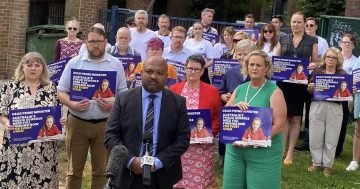
ACT and NSW Catholic teachers joined with NSW public school educators to strike together, demanding real action on workload and pay. Photo: Claire Fenwicke.
ACT and NSW Catholic school teachers joined forces with hundreds of NSW public school educators today (30 June) demanding an overhaul of the system.
The NSW Teachers Federation and the Independent Education Union joined together for the first time in 26 years, demanding real action on workload and salary issues.
Queanbeyan High School Teachers Federation representative Mitch Andrew said the issue boiled down to insufficient teachers on the ground leaving staff “broken”.
“Our senior students are in the library [doing independent learning ] three out of five sessions every day,” he said.
“Our teachers are broken. They’re hiding from students and colleagues. They’re breaking down and crying because they can’t do this job.”
He said propositions from the government were like “putting a bandaid on an artery” and that more needed to be done to improve salary, reduce workloads and attract more people to the profession.
“School is meant to be one of the safest places for kids, but they’re not because they can’t be supervised,” Mr Andrew said.
He also described using his ‘planning hour’ each day to conduct welfare checks on his students, which he said his training had not prepared him for.
“[My colleagues and I] have spent many hours looking after kids who have cut themselves, sitting with a student who has swallowed razor blades waiting for the ambulance. I know someone who physically had to take a noose from around a kid’s neck,” he said.
“I didn’t do any medical or counselling training; I wasn’t prepared for what we would have to do.”
Queanbeyan High School women’s representative Robyn Slater also described the dire situation teachers were facing.
She was particularly concerned for senior students as their age meant their classes were always the first to be unsupervised.
“They’re missing out by default because they’re seen as the more independent learners,” Ms Slater said.
“Some come into school and don’t have a teacher all day.”
A common statistic at the protest was that preparation times for high school teachers had not changed since the 1950s and for primary school teachers since the 1980s.
Ms Slater said she had grave concerns for teachers beginning their careers in a system that was “already broken”.
“They think this is normal, but it isn’t, and it shouldn’t be acceptable,” she said.
“We are professionals and we need to be treated as such. We need time to be able to do our job effectively so that we can help the students.”
A recent report found seven in 10 teachers were reconsidering their careers.
IEU ACT representative Daniel Burns said he worried what the profession would look like in five years if something didn’t change.
“We’re essentially being asked to do more with less and then [the government is] wondering why they can’t attract more people into our wonderful profession,” he said.
“What brings us joy is gone or is at least buried under layers of bureaucracy.
“This is not just an exercise in throwing stones. We want to make the profession better.”
Braidwood Central principal Nerida Mosely agreed.
She was concerned students seeing their teachers burnt out would turn them off education as a career option.
“[They’re looking at us and thinking] I can take my education and do something else in society, and then that leaves us with massive teacher shortages,” she said.
She demanded the government stop treating teachers as “scapegoats for a system in crisis”.
“Just giving us new buildings is not going to provide a future for education or a future for our country, which is what we’re in this business for,” Ms Mosely said.
“It is an investment – when is it going to be seen as such rather than a cost?”
The NSW Government offered a 5.1 per cent pay increase to educators as part of the recent state budget.





Education Minister Sarah Mitchell said it was “deeply disappointing” the unions had chosen to strike.
“After two-and-a-half years of learning disruption due to COVID-19, another day out of the classroom is unnecessary and will cause major upheaval for hardworking parents,” she said.
Based on the NSW Department of Education’s preliminary data, about 75 per cent of NSW public schools faced either some or severe disruption because of the strikes.
Only one Canberra school was closed as a result.




















